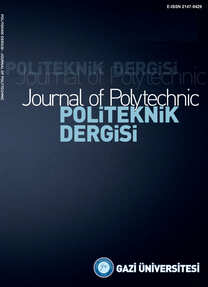Yerleşik ve Gömülü Uygulamalarda Kontrol İşlemleri ve PC’de Yazı Yazmak İçin Kullanabilen Düşük Maliyetli Genel Amaçlı Bir Konuşma Tanılama Sistemi
Konuşmacı bağımlı, yazı yazma, RS232, PS/2, kontrol
A Low Cost General Purpose Speech Recognition System Used to Control Processes in The Embedded and Stationary System and Write Texts on The PC
Speaker dependent, texting letter, RS232, PS/2, control,
___
- [1].http://www.speech.cs.cmu.edu/comp.speech/Section6/Q6.1.html, 05.10.2017.
- [2]. https://www-03.ibm.com/ibm/history/exhibits/specialprod1/specialprod1_7.html, 16.08.2016.
- [3]. Alsaka Y.A., Doll S.A., Davis S., “Portable speech recognition for the speech and hearing impaired”, Southeastcon '97. Engineering new New Century., Proceedings. IEEE, Blacksburg, VA, USA, 151-153, (1997).
- [4]. Thiang, “Implementation of speech recognition on MCS51 microcontroller for controlling wheelchair”, International Conference on Intelligent and Advanced Systems, Kuala Lumpur, Malaysia, 1193-1198, (2007).
- [5]. Mosbah B.B., “Speech recognition for disabilities people”, Information and Communication Technologies, 2006. ICTTA '06. 2nd, Damascus, Syria, 864-869, (2006).
- [6]. http://download.springer.com/static/pdf/, 19.08.2016, “Chapter 9, Speech Technology In Military Application”, Springer,_fulltext, pp:289-330.
- [7]. McCallum M.C., Cambell J.L., Richman J.B., Brown J.L., “Speech recognition and in-vehicle telematics devices: potential reductions in driver distraction”, International Journal of Speech Technology, 7(1): 25–33, (2004).
- [8]. Lin P.C., Wang J.F., Lin S.C., Mo M.H., “An embedded system design for ubiquitous speech interactive applications based on a cost effective SPCE061a micro controller”, UIC 2006, Ubiquitous Intelligence and Computing, Springer-Verlag, Berlin Heidelberg, LNCS 4159: 83-92, (2006).
- [9]. Rabenja R., Amine S., Davrdson J., “Speech recognition for game control”, IEEE, Poster Session I : System Level Design, 0-7803-8322-2/04/$20.00 02004 IEEE, 97-99, (2004).
- [10]. Haleem M. S., “Voice controlled automation system”, Proceedings of the 12th IEEE International Multitopic Conference, 508-512, December, 23-24, (2008).
- [11]. Ferrando F., Nouveau G., Philip B., Pradeilles P., Soulenq V., Van-Staen G., Courmontagne P., “A voice recognition system for a submarine piloting”, OCEANS 2009 - EUROPE, Bremen, Germany, (2009).
- [12]. Türk O., Arslan L.M., “Speech recognition methods for speech theraphy”, Signal Processing and Communications Applications Conference, 2004. Proceedings of the IEEE 12th, 410-413, (2004).
- [13]. Fezari M., Salah M.B., “A voice command system for autonomous robots guidance”, IEEE, AMC’06-Istanbul, Turkey, pp:261-265, (2006).
- [14]. http://www.tekonoloji.com/2015/06/ses-izi-ve-nefes-izi-parmak-izinin.html, 06.10.2016.
- [15]. Burunkaya M., Yorulmaz F., “Mikrodenetleyici tabanlı elektronik nota eğitim seti tasarımı ve yapımı”, IATS ’09, 5. International Advanced Technologies Symposium, Karabük, Türkiye, sayfa: 556 – 561, May 13-15, (2009).
- [16]. Ruiz C.B., Tapias F.E.G., del-Brio B.M., Nuez A.B., Marques N.J.M., “Microcontroller implementation of a voice command recognition system for human-machine interface in embedded systems”, IEEE, 0-7803-9402-X/05/$20.00©, pp:587-591, (2005).
- [17]. http://www.imagesco.com/speech/HM2007.pdf, 19.08.2017.
- [18] https://www.lumenvox.com/resources/tips/types-of-speech-recognition.aspx, 05.10.2017.
- [19]. https://tr.wikipedia.org/wiki/Braille_alfabesi, 16.08.2016.
- [20]. Chan F.Y., Khalid H.M., “Is talking to an automated teller machine natural and fun?”, Ergonomics, 46(13-14): 1386–1407, (2003).
- [21]. Yuanyuan S., Jia L., Runsheng L., “Single-chip speech recognition system based on 8051 microcontroller core”, IEEE Transactions on Consumer Electronics, 47(1): 149-153, (2001).
- [22]. https://en.wikipedia.org/wiki/Data_transmission, 19.08.2016.
- [23].http://www.camiresearch.com/Data_Com_Basics/RS232_standard.html, 19.08.2016.
- [24]. http://www.computer-engineering.org/ps2protocol/, 19.08.2016.
- [25]. http://www.elektrotekno.com/about1660.html, 19.08.2016.
- [26]. Yıldır M., Burunkaya M., “Ses sentezleyici kullanılan ses tanıma düzeni tasarımı ve yapımı”, UMES’07, Kocaeli, 1: 395-398, (2007).
- [27]. http://www.imagesco.com/speech/SR-07.pdf, 19.08.2017.
- [28]. http://320volt.com/rs232-seri-portun-pic-mikro-denetleyiciler-ile-kullanimi/, 19.08.2016.
- [29]. Burunkaya M., Yıldız S., Karataş İ., “Öğrenci proje çalışmalarında kullanılabilecek düşük maliyetli ve genel amaçlı bir veri toplama sisteminin (VTS) gerçekleştirilmesi”, Bilişim Teknolojileri Dergisi, 4(3): 21-28, (2011).
- [30]http://www.lima.com.tr/Support/Lima/PS2Keyboard_TR.PDF 15.08.2016, 12:09.
- [31]. http://320volt.com/mikrodenetleyici-uygulamalari-bilgiler-pic-c-pic16f877/, 19.08.2016.
- [32].http://www.ume.tubitak.gov.tr/tr/laboratuvarlarimiz/laboratuvar-ortam-kosullari-1 15.08.2016, 17:11.
- [33] NL-21/NL-31 Sound Level Meter, Rion Co., Ltd., Tokyo, Japan. http://www.noisemeasurement.com.au/downloads/NL-21.pdf, 14.08.2017.
- [34] Ertaş F., Eskidere Ö., “Yazılım tabanlı sözcük sentezleyici”, DEÜ Müh. Fak. Fen ve Mühendislik Dergisi, 3(1): 1-27, (2001).
- [35]. Efendioğlu S., İşcan A., “Türkçe ses bilgisi öğretiminde ses olaylarının sınıflandırılması”, A.Ü. Türkiyat Araştırmaları Enstitüsü Dergisi (TAED), Erzurum, 43: 121-143, (2010).
- [36]. Goktas, H.H., Yucel, M., "A fuzzy logic based device for the determination of temperature dependence of EDFAs", Microwave and Optical Technology Letters, 50(9): 2331-2334, (2008).
- [37]. Celebi, F. V.,Yucel, M., Goktas, H.H., “Fuzzy logic based device to implement a single CAD model for a laser diode based on characteristic quantities”, Optik, 123(6): 471-474, (2012).
- [38]. Celebi, F. V.,Yucel, M., Goktas, H.H., Danisman, K., “Intelligent modelling of alpha (α) parameter; comparison of ANN and ANFIS cases”, Optoelectronics and Advanced Materials – Rapid Communications, 7(5-6): 470–474, (2013).
- ISSN: 1302-0900
- Yayın Aralığı: Yılda 4 Sayı
- Başlangıç: 1998
- Yayıncı: GAZİ ÜNİVERSİTESİ
Trafik Işığı Tespiti Yapan Bir Sürücü Güvenlik Destek Sistemi
Çağlar KILIKÇIER, ERSEN YILMAZ
FUNDA KAHRAMAN, GÖKHAN BAŞAR, Zülfü KOÇOĞLU, Emre YENİYIL
Modelling Nitrate Prediction of Groundwater and Surface Water Using Artificial Neural Networks
MUSTAFA BURUNKAYA, Melek DİJLE
Faz Değiştiren Malzemelerle Termal Enerji Depolayan Bir Isı Değiştiricisinin Sayısal Analizi
Research On The Shear Behaviour Of Masonry Walls Strengthened With Steel Members
Ali ÖZGEDİK, Anıl ÖZDEMİR, Yağmur KOPRAMAN, Rüçhan Emir ÖZMEN
Kil Minerallerinden Alümina Üretimi: Güncel Değerlendirmeler
Murat ERDEMOĞLU, MUSTAFA BİRİNCİ, Turan UYSAL
İnşaat Proje İmalatlarında Artırılmış Gerçeklik Teknolojisi Uygulamaları
Beton Üretiminin Karbondioksit Emisyonları Açısından Önemi: Toplumsal ve Çevresel Etkiler
Yüksek Fırın Cüruf Katkılı Çimento Pastalarının Elektriksel Özdirençlerinin Araştırılması
